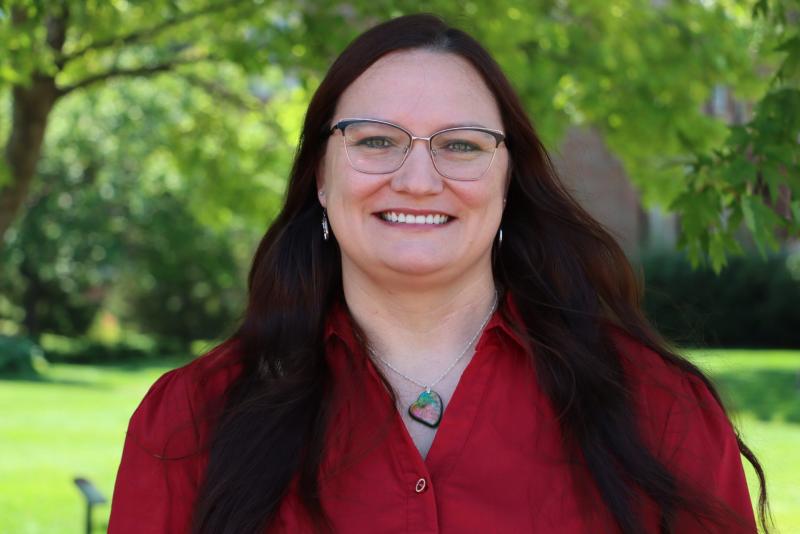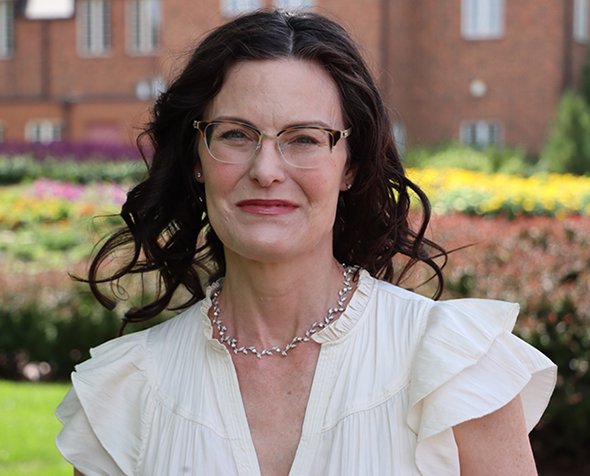CAHSS Criminology Professor’s Work Explores the Covert Nature of Human Trafficking

Growing up in small-town Nebraska, University of Denver (DU) Assistant Criminology Professor Calli Cain noticed something amiss with certain friends. “Many were working in factories and fields way before the legal age,” she said. “That felt wrong and ultimately led to my interest in criminal justice and the relationship between childhood trauma and victimization.”
Today, Cain studies and teaches all aspects of human trafficking, but her journey began as an undergraduate at the University of Nebraska-Lincoln, where she dropped out sophomore year to gain firsthand experience working with youth entangled in both the criminal justice and child welfare systems.
At Boys Town, Cain worked with youth who had been released from inpatient psychiatric care, suffered extensive trauma and committed serious offenses. The experience motivated her to return to school to learn how institutions could protect abused kids and break the cycle of violence.
She earned a master’s and PhD in criminology and criminal justice, worked within Nebraska’s juvenile justice system on behalf of incarcerated and runaway youth and through study abroad, expanded her research to include international human trafficking.
After six years serving on the faculty of Florida Atlantic University, Cain joined the College of Arts, Humanities & Social Sciences (CAHSS) Department of Sociology & Criminology faculty in 2024. Her research on human trafficking includes sex trafficking and the exploitation of runaway kids as well as addressing lessor known types of trafficking such as child soldiering, forced marriage, child marriage and human-organ trafficking.
In Cain’s eye-opening class “Special Topic: Human Trafficking,” [offered again in winter quarter 2026] she covers a range of topics including sex trafficking and labor trafficking — a significant problem in Colorado, especially in the construction and hospitality industries [RTI Labor Trafficking Report, 2025]. Students interested in careers ranging from criminal justice to psychology, political science, law and business find the class especially relevant to their future career goals, Cain said.
Students debate how laws and policies related to prostitution affect sex trafficking, including how efforts in the United States to decriminalize prostitution could help sex-trafficking victims. The class also considers the geopolitical issues that exacerbate human trafficking including globalization and specific trade policies. “A lot of the cheap goods that we purchase in the United States are a direct result of labor trafficking or forced child labor in other places,” she said.
Cain encourages students to help raise awareness by sharing what they’re learning with others. In her recent class, she assigned students to launch a conversation about human trafficking with a person they knew and reflect on the experience. “Just having students talk to somebody empowered them and helped dispel myths,” Cain said.
Criminology and psychology major Shay Payne cited gaining an understanding of the complexity of human trafficking as her biggest takeaway. “Human trafficking is a deep-rooted issue that may never go away and there is no one-size-fits-all solution but that doesn’t mean we can’t do anything. Even little things — like speaking up about suspicions — matter.”
Cain admits the nature of her research takes a toll and urges students to take care of their mental and emotional health “because it often exposes them to very difficult situations they never would have thought about.” She likewise prioritizes taking care of herself and “remembering the good even one person can do.”
She pointed out that human trafficking of all kinds exists because it occurs under the radar, generates huge profits and is relatively low criminal risk compared with selling drugs or weapons.
“As long as there is inequality, poverty, racism, drug addictions and other factors that play into it, human trafficking will continue. I encourage everyone to educate themselves because vulnerable victims for a variety of reasons are too fearful to self-report. People need to learn about the problem and the signs and how they can help.”
Find out more about human trafficking or call the Colorado human trafficking hotline at 866.455.5075 if you suspect you or someone you know may be a victim of human trafficking. Cain welcomes speaking opportunities on human trafficking and has trained school counselors/social workers and law enforcement officers on recognizing the signs of human trafficking. You can contact her at calli.cain@du.edu.





